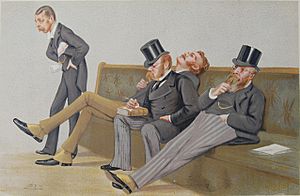Fourth Party facts for kids
The Fourth Party was a special group of four British MPs. An MP is a Member of Parliament, someone elected to represent people in the UK government. These four members were Lord Randolph Churchill, Henry Drummond Wolff, John Gorst, and Arthur Balfour.
They became well-known across the country. They worked together in the British Parliament from 1880 to 1885. They were all part of the Conservative Party. But they were "backbench" members. This means they were not in the main leadership roles.
This group strongly criticized both the Liberal government and the main Conservative leaders. They felt both sides were not strong enough.
Contents
What Was the Fourth Party?
The Fourth Party was not an official group. It was more like a nickname for these four friends. They were all young and wanted to make a big impact. They wanted to shake things up in Parliament.
Their Main Actions
The Fourth Party often spoke out on important issues. They gained attention for their strong opinions.
The Bradlaugh Affair
One big issue they focused on was the "Bradlaugh affair." This was about a politician named Charles Bradlaugh. Many Conservatives were upset that the Prime Minister, William Gladstone, allowed Bradlaugh to be in Parliament. The Fourth Party often spoke about this. They showed how many Conservatives felt about it. About two-thirds of all Conservative MPs supported their views on this matter.
The Irish Land Bill
They also strongly disagreed with Gladstone's government about the Irish Land Bill of 1881. This bill was about land ownership in Ireland. The Fourth Party actively fought against it. They believed it was a bad idea for the country.
How They Operated
The Fourth Party had a unique way of working. A report in The New York Times described them well. It said they would "act as skirmishers to the main body." This means they would go ahead like scouts in a battle. They would "pop out here and there to fire a shot at the Government." This means they would suddenly raise questions or criticisms.
They were "ostensibly rebuked" by their own Conservative leaders. This means it looked like their leaders were telling them off. But in reality, they were "really supported" by them. Their leaders secretly liked what they were doing. It helped the Conservative Party without the main leaders having to be so direct.
Their Legacy
The Fourth Party had a lasting impact on British politics. They showed how a small group of determined politicians could make a difference.
Influence on Later Groups
Later, another group in the Conservative Party formed. They were called the Hughligans. This group tried to be like the Fourth Party. According to historian Rhodri Williams, the Hughligans were a "self-conscious attempt to recreate the 'Fourth Party'." They wanted to have the same energy and influence.


